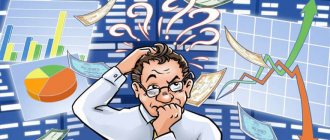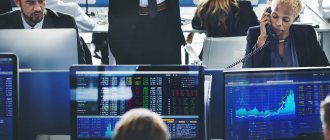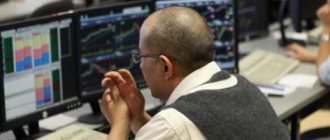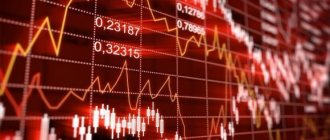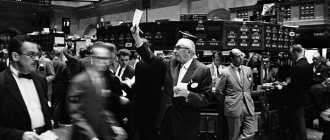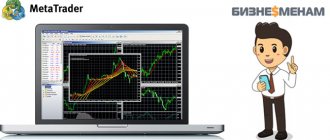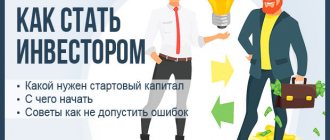Hello, dear reader!
The investment boom that swept the world with the advent of online trading has spread to almost all financial markets and has made the trading profession one of the most in demand.
For new investors, the question of how to trade on the forex market, which is the most accessible and highly liquid (the daily Forex turnover is about $6 trillion, which exceeds the trading volumes on all the world's stock exchanges combined), has arisen.
What is Forex trading and how does it happen?
Forex (full name foreign exchange) is an international interbank foreign exchange market created in 1978 to conduct free currency exchange operations (the impetus was the US refusal to use the gold standard in valuing the dollar, which led to the collapse of the Bretton Woods currency system).
Forex trading does not involve transactions with real assets (it is virtual in nature) and can pursue different purposes - speculation, hedging, regulation.
Forex is not tied to a specific exchange platform and allows you to conduct operational activities around the clock, from anywhere in the world, provided you have the Internet and a special platform that is installed on a PC or portable mobile device.
Who's playing
Access to forex operations has become possible not only for tycoons on Wall Street - everyone has a chance to distinguish themselves in a new field of activity, regardless of the thickness of their wallet.
Both market makers (central and top commercial banks, financial holding companies, hedge funds, private investors with large capital) and ordinary traders play on the same field (you can participate in trading with a starting deposit of $1, using leverage and micro-accounts provided by brokerage companies).
What is traded on Forex
Initially, the main asset for trading on forex were currency pairs. With the growth of popularity, the range of trading instruments has also grown - with the help of modern trading terminals, a trader can speculate not only on exchange rate differences between currencies, but also receive profit from correct forecasts for the rise/fall of prices for stocks, indices, precious metals, and commodities.
In the “trading conditions” section of Forex brokers you can find a list of assets used, indicating the features of trading on them - the size of the maximum leverage, account type, etc. (in the terminal, in the “Market Watch” window, current quotes of all Forex assets are reflected).
List of Forex pairs in the MT4 terminal
Is it worth playing?
The forex market has become a good alternative to bank deposits, where interest rates no longer cover inflationary losses. If the psychological attachment to passive investing has been overcome, then it is worth becoming the master of your financial well-being.
The potential profitability from Forex transactions is several times higher than traditional methods of generating income - purchasing securities, precious metals, etc. assets. At the same time, you can try your hand at training on a demo account.
Advantages and disadvantages
The advantages of forex are confirmed by the quantitative composition of participants in this market - the multi-million army of forex traders is constantly growing.
Main development incentives:
- level of potential income;
- the ability to use forex trading as an additional source of income;
- flexible work schedule (24-hour trading is possible);
- affordable initial capital requirements.
Physicists and lyricists, students and pensioners can master the wisdom of forex.
Forex cannot be called a place for carefree “printing” of money. It is well known that there are high risks here, therefore:
- a gaming approach without basic knowledge is a shortcut to losing your deposit;
- It is difficult to count on success for traders who abuse aggressive strategies, are prone to emotional decisions, and ignore the rules of money management.
It is possible to give a real assessment of the advantages and disadvantages of forex only through personal practical experience.
Real time quotes
You can monitor quotes in real time using 4 ways:
- Through trading terminals . The most convenient and popular way. MT terminal - it consumes very little traffic. And you can immediately open a deal.
- Mobile devices (Android, smartphone, etc.). If it is not possible to monitor the monitor constantly, then choose this option - it will be possible to set up in the broker’s personal account the function of receiving a message when the price reaches the required level.
- Special programs that are downloaded and installed on a laptop or computer.
- Specialized sites providing not only quotes for currency pairs, but also futures, stocks and popular indices. There will also be access to moving charts.
You should not exclude receiving information about quotes from regular brokers, as they may differ significantly from other data.
Is it possible for a beginner to make money on Forex?
There is a prejudice that only professionals who have completed many years of practical school make money in Forex. The best answer to this will be the achievements of novice traders who have proven their “professional suitability” in the famous experiment of R. Dennis, described in detail in the book by K. Feis “The Way of the Turtles”.
The results of trading amateurs proved that the absence or presence of past experience does not have a decisive influence (the participants in the experiment completed only a basic training course).
How much can you lift?
You shouldn’t fall into euphoria and count on the mythical 1000% profits that some brokerage houses in the forex market talk about (you can’t call them companies).
The real earnings of successful Forex traders can reach up to 100% per annum, but beginners are better off focusing on other indicators: the main thing is to maintain a positive balance of profitable and unprofitable transactions.
Staying afloat, you can think about increasing profitability by adding new forecasting tools and improving proven trading strategies.
How long does it take to learn how to make money on the stock exchange?
The question of the time it will take to master the basics of trading on Forex depends on the individual characteristics of the trader, the intensity and methods of preparation (self-training, on-site courses, remote training).
As a rule, “school theory” can be mastered in a couple of months; another month will be spent on practical testing of knowledge and skills (variants of demo and/or micro accounts).
Forex instructions for beginners
Many people wonder: is it really possible to make money on Forex? How to start to avoid mistakes?
The currency exchange provides an opportunity to receive a stable income. But for this, beginners need to take the right first steps.
Only an error-free start determines further success. To start trading correctly, a beginner needs the following:
- choose a reliable broker;
- complete basic training;
- find a profitable strategy;
- gain experience on a demo account;
- choose a suitable financial instrument;
- trade following the chosen strategy.
Choosing a Forex broker is the most important task. The broker plays an important role in whether a trader can achieve success or not.
In simple terms, brokers are companies that help traders carry out all trading transactions in the foreign exchange market. From a legal point of view, an ordinary person will not be able to independently enter the foreign exchange or stock market. So, in order to trade currencies or other financial instruments, a trader will need a brokerage company. To choose the right broker, you need to pay attention to the following:
- how long has the brokerage company been in existence;
- does the broker have a license to carry out brokerage activities;
- does the broker have a good rating?
- what is the minimum deposit to start trading;
- Are the commissions high?
- Are there any bonus programs?
The mentioned criteria are very important when choosing a broker. By following them, you can make the right choice and, as a result, start making money in the market.
Here, as an example, you can take the broker AMarkets, which has been operating on the market since 2007 and has a good reputation. The amount of commissions in this company is minimal, there are enough bonuses and promotions. And the reviews are positive. For more than ten years of operation, the company has accumulated a huge number of positive reviews.
How to start trading on forex
The procedure for accessing Forex trading is simplified as much as possible and takes a few minutes:
- Go to the website of the selected broker (preliminarily decide on the specialization - stock, binary or forex market).
- Fill out the proposed registration form.
- Install the trading platform on your PC.
- Select account type.
- Top up your deposit.
- Start trading.
But in order to make a decision on choosing a broker for Forex, you should not save time. Here, the future trader needs to study both the trading conditions and the “ins and outs” of the company.
Warning about Forex and binary options
Expert opinion
Vladimir Silchenko
Private investor, stock market expert and author of the Capitalist blog
Ask a Question
Companies providing online trading services (binary and forex brokers) inform their clients about the high risks associated with operating activities in financial markets (requirement of regulatory authorities).
When you open the official website of any Forex broker, you will definitely see a warning notice (usually at the very end in small print) that the trader must be aware of the risks that trading with leverage carries, and even without appropriate preparation.
Unfortunately, unscrupulous brokers are also among these risks. Losses from their actions on Forex are usually called non-trading.
Features of working as a currency trader
Like any other job, trading has its advantages and disadvantages. By understanding them, beginners will be able to understand this profession in advance and understand whether it is suitable for them or not.
Benefits of working as a trader
- The ability to engage in currency trading from any place where there is Internet access.
- Any adult can start trading.
- A currency trader is his own boss.
- Independent planning of your work schedule (the Forex market operates around the clock on weekdays).
- You can earn money five days a week (Monday to Friday), except holidays.
- High potential income with well-calculated risk.
- The ability to use broker credit funds on favorable terms through leverage (may carry high risks).
- You can start trading with $10 on cent trading accounts.
Disadvantages of currency trading
- When using leverage, the trader is exposed to high risks.
- Psychological component (frequent stress, waiting for a way out of drawdowns, a series of unprofitable trades, etc.).
- When trading without leverage, you will need a large amount of money.
- Hard training before reaching a stable profit.
- Unforeseen events in the market that may lead to losses. For example: “Black swans” or the price of WTI oil going into the negative zone.
Before becoming a trader, you should carefully understand all the possible risks in the financial markets, and then start trading with real money.
It is also important to diversify your capital and distribute it into several different business segments. For example, distribute capital into three proportional parts: allocate one part for currency trading, the second for bank deposits, and the third to buy securities or real estate.
Who is a trader and what does he do?
Trader translated from English is a trader. It is precisely trading that these people do, not just standing at counters with goods, but conducting purchase/sale transactions on specialized financial platforms - exchanges.
The trader’s task, at first glance, is simple - to make money on the difference in the value of a financial asset (currency pairs, stocks, indices, precious metals, raw materials, etc.). In fact, such speculation requires the presence of many qualities - both innate and acquired.
Today, the profession of a trader is one of the most prestigious and profitable (not a bad combination).
How does a trader work?
Traders practice different work options, which depend on their level of qualifications, availability of equity capital, and individual psychological characteristics.
Working for yourself
Most traders prefer to work independently, taking upon themselves all the benefits, burdens and adversities.
Newcomers to forex start in different ways:
- immediately set off on their own;
- become members of a trading team.
Team trading on Forex has its advantages:
- the combined capital allows you to trade with a large deposit (risks are reduced, a wide range of strategies is used);
- team analytics is much more effective;
- the emotional component of bidding is compensated by collective support;
- costs for equipping a trader’s workplace are minimized.
Working for a company
Professional traders who are able to prove their level with real profitable accounts can apply to work under the “umbrella” of market makers.
Large financial structures attract such specialists on a regular salary and negotiate bonuses in the form of a percentage of profitable forex transactions.
Qualities required to work as a trader
The basic rule that any novice trader must learn is that stock trading on Forex brings profit only to those who treat this activity as a profession.
History knows many examples when mathematicians and economists (kindred spirits for mastering technical and fundamental analysis) achieved outstanding success in trading.
But the lucky ones also included a contingent that was far from knowledge of higher mathematics and macroeconomic indicators - doctors, psychologists and even housewives. Everyone had one thing in common - a professional attitude towards the new business.
Summarizing the characteristics of different groups of successful forex traders, experts identified a set of qualities that a trader should have:
- analytical thinking;
- intuition;
- introspection;
- stress resistance (the ability to withstand high emotional stress).
How much can a trader earn?
As I already mentioned, the real profitability of a trader on the forex market on average fluctuates around 100% per annum.
The level of profitability of forex transactions depends on:
- lot size (standard volume 100,000 USD);
- leverage (from 1:10 to 1:1000);
- the strategy used (intraday, medium-term, long-term);
- degree of volatility of the selected financial asset.
Trading in the foreign exchange market and the amount of leverage
The foreign exchange market is the most leveraged market. Leverage can bring you both profits and losses. For example: a leverage of 1:500 means that with an investment of 1 euro, the Forex broker adds 500 euros and you can invest in a position of 500 times your initial capital.
Many traders find the leverage offered by online brokers to be a great opportunity to make money. Yes, leverage is a useful tool if it is used well, but keep in mind that this type of investment in the forex market is risky. Profits or losses increase and may be significant.
Imagine that you have just managed to close a position at the euro-dollar rate of 1 lot. You won 50 pips. Your account is in US dollars. What is the profit? The calculation is very simple: $10 is the pip value of the contract, euro, dollar * 50 pips earned = your profit in dollars is $500.
Most online brokers do not charge for Forex trading as long as the client pays the spreads. With ECN or No Dealing Desk accounts, clients pay interbank spreads and, for an online broker, commissions. Fees depend on the type of trading account you choose.
Forex contracts have a standard size: 100,000 units. The currency of the foreign exchange contract is the first currency of the currency pair. Here are the contract sizes:
- 1 lot EURUSD = 100,000 euros
- 1 lot GBPUSD = 100,000 pounds sterling
- 1 contract USDJPY = 100,000 US dollars
- 1 AUDCAD contract = 100,000 Australian dollars
- Exchange rate - 24/5
The Forex currency market is a global market open 24 hours a day from Sunday evening 23:00 to Friday evening 22:00. Therefore, it is possible to trade at any time. Forex is an over-the-counter market and there is no central bank that regulates all orders. To become a part of this market and invest in exchange rates, all you need is a trading account with an online broker and a stable internet connection.
Who is an investor and what does he do?
The concept of “investor” unites legal entities and individuals who invest capital in the purchase of assets or projects to generate additional income.
United by a single ultimate goal, investors have different approaches to achieving it and are conditionally divided into “conservatives” (purchase low-risk assets for the long term) and “speculators” (a striking example is Forex traders).
How investors work
Investment methods depend on a number of factors:
- amount of free capital;
- level of financial literacy;
- acceptable time intervals;
- assets used.
The technical execution of investment deposits (be they securities, shares in projects or currency speculation) is carried out in most cases on stock exchanges, through brokers. You can do without intermediaries when it comes to bank deposits or the acquisition of real material assets (precious metal bars, coins, etc.).
How much do investors earn?
If the main objective of an investment is to preserve funds (inflationary losses are taken into account), then the level of profitability is focused on this indicator.
Such investors will not speculate on exchange rates or buy junk stocks. The goals of aggressive investment strategies are aimed at significant capital growth and can be several times higher than the return on conservative investments.
Discarding “advertising provocations” about super-profits, you can focus on an average annual income of 5 to 50%.
Dividends on shares
One of the common types of investments is the purchase of shares not for the purpose of resale, but with the expectation of receiving dividends on them. In fact, the investor becomes a shareholder of the company and takes part in the distribution of its profits (in the part allocated for dividend payments).
The level of return will depend on the degree of risk and duration of investment.
Shares of “blue chips” (for example, Gazprom, Norilsk Nickel, Sberbank) are reliable, but grow slowly (yield can range from 4 to 8%), while the acquisition of “junk” shares (little-known companies) is associated with high risk, but they can bring in the future significantly larger dividend payments (from 8 to 20%).
Government bonds
One of the investment instruments in Russia, which occupies an intermediate position in terms of profitability between bank deposits and exchange-traded financial assets, is OFZ government securities (federal loan bonds).
The purchase of OFZs for individuals has become possible since 2020. The government acts as the guarantor of OFZs (the issue is carried out by the Ministry of Finance). OFZ are traded in rubles on the Moscow Exchange (yield from 4 to 7%).
How to choose OFZ for investment
The selection of OFZ depends on the priorities in terms of investment terms, as well as on the type of coupon (divided according to the method of percentage calculation and indexation of the inflation rate).
Interest in this tool is due to:
- Availability - the value of one coupon is 1000 rubles.
- Liquidity – high demand for purchases.
- Wide choice - there are 41 OFZ options (divided by cost and maturity date).
- Low risks - OFZs are backed by government guarantees.
Forex liquidity and the basics of trading in the foreign exchange market
In the international economy, millions of currency transactions occur every day. When a European exporter buys raw materials that are priced in dollars. To pay the bills, he must convert his funds into euros.
Central banks most often regulate the exchange rates of their currencies: for example, the Swiss National Bank closely monitors the exchange rate of the Swiss franc and accordingly intervenes in prices on the foreign exchange market.
There are a lot of players in the foreign exchange market, and this results in significant volumes of transactions. If you are looking for a market for currency exchange rate speculation, Forex is an excellent solution to your foreign exchange trading investment strategy and a good tool for making profits.
The functioning of the foreign exchange market allows you to trade, taking into account a large number of exchange rates.
Here are the 8 most liquid and most traded world currencies:
- US dollar (USD),
- Euro (EUR)
- British pound (GBP)
- Japanese yen (JPY)
- Swiss franc (CHF)
- Australian dollar (AUD)
- Canadian dollar (CAD)
- New Zealand dollar (NZD)
Who is more profitable to be a speculator or an investor?
There is no clear answer to the question. Both investors and speculators live in a financial world that is subject to the influence of a variety of factors, often unpredictable.
The collapse of key stock indices, currency wars, bankruptcies and mergers of large corporations, force majeure of various natures are shocks that “hit” all categories of investors (both market makers and ordinary forex market traders).
It is not always possible to find a middle ground, so the ability to hedge risks, for example, diversify an investment portfolio, comes to the fore.
The longer the investment horizon, the greater the chance for an investor to outperform a speculator.
Trading on the foreign exchange market for beginners - an example of investing
To make money in the market from currency fluctuations, you must take a position in the direction of the asset's movement. You can trade almost any currency in the world, but most likely as a beginner you will be looking at the major currency pairs. Currencies are traded in pairs, and you always buy or sell the first currency of the pair:
Long position on euro-dollar
If you think the euro will rise against the dollar, you can buy EUR/USD. The euro/dollar exchange rate must rise for your position to be profitable.
Selling a position on euro-dollar
Otherwise, if you think the euro is depreciating against the dollar, you can create a sell order on EUR/USD in the hope that the euro will fall in value against the dollar.
How to make money on the stock exchange - TOP real options for earning money
The effectiveness of investment directly depends on the optimal choice of the method of its implementation. As options, I consider working independently and in a team with professional managers (individuals or legal entities).
Independent trading
Investors or forex traders who have sufficient knowledge in the field of fundamental and technical analysis often rely on their own strengths and resort to the services of only mandatory intermediaries - brokers.
Transfer of funds to trust management
Trust management can be used on different financial platforms and assumes that a managing manager will be responsible for the investment or trading process, who manages the principal’s capital in his interests (the terms of cooperation, including the manager’s bonuses, are stipulated in the agreement).
The most popular within the framework of remote control are PAMM accounts, which give full control over the state of invested funds (input/withdrawal) and allow you to choose strategies based on the ratio of risk and profitability.
Participation in affiliate programs
Affiliate programs can become a separate source of passive income without investing your own funds. Here the emphasis is not on knowledge of the laws of functioning of markets, but on abilities in the field of PR technologies.
The essence of affiliate programs offered by brokers and investment companies is to advertise their product and attract new clients to the ranks of investors/traders. Based on the agency agreement, bonuses are paid, which are tied to the amount of investment capital attracted to the company.
Trade training
Investors who do not have a special education in the field of economics and finance, who do not trust the management of their capital to third parties, are doomed to “sit down at their desks.” You can take advantage of full-time and distance learning on a paid and free basis.
Currency markets of the world
The modern world economy will practically not be able to operate at the proper level if there is no developed financial market. One of its main components is the foreign exchange market, represented by numerous types. It is also called the insurance market because it provides insurance against currency risks.
Today there is a formed currency system, which is based on constantly changing exchange rates and the development of telecommunications technologies. Foreign exchange markets, whatever their types, have all the parts that make up a regular market:
- objects and subjects
- supply and demand
- structure
- communications
- commodity prices
- investments
- speculators
There are a large number of financial centers in the world, where the largest foreign exchange markets are located. They are located in cities such as:
- Paris
- London
- Tokyo
- Hong Kong
- Zurich
They are also available in other cities around the world. The funds that enter the circulation are sent to banking institutions. One of the largest in terms of money turnover is the London foreign exchange market. It handles approximately $500 billion worth of transactions. If we talk not only about the capital of Great Britain, but also about the entire state as a whole, it can be noted that its stock market is considered one of the most developed in the world.
Where to start playing on Forex: deciding on a trading strategy
Forex trading strategies are an integral component of trading and are individual in nature, which reflects the preferences of the exchange player.
Trading with the trend
Trend strategies are considered the most effective and are used by all forex traders - both beginners and professionals. The common phrase “trend is your friend” is not disputed by anyone, but it is not always possible to make friends with a trend.
The main problem is determining the truth of the dominant trend, its duration and corrections. For trading on large timeframes, this task is simplified, but lovers of pipsing and scalping are forced to settle for mini-trends on short time intervals, where “market noise” generates a lot of false signals.
To forecast trend movements in Forex, various graphical analysis tools are used - indicators/oscillators, patterns, levels.
Forex market. Trends on TF Weekly (graph of the USD/JPY currency pair)
Scalping
A popular strategy for novice traders for forex, which is used on TF M1, M5 and is characterized by a large number of transactions with short stop orders. The scalper's task is to take a small profit (5-10 points) from each trade and ensure an overall positive balance.
Forex market. Price jumps on TF M1 (mini-trends for the USD/CHF currency pair)
Indicative
Forecasting the forex market based on indicator data takes up a significant part of technical analysis and is used in building strategies for any timeframe and forex assets.
Trading terminals are equipped with a wide range of indicators that have different specifics (trend, level, volume), which allows you to create reliable strategies based on combinations of these tools (things are better on the MetaTrader terminals, which are the leaders in popularity among Forex traders).
Indicator strategies are mainly used by beginner forex traders who are taking their first steps in studying the huge layer of knowledge hidden under the term “technical analysis”.
Forex market. Chart with MACD, Stochastic and Alligator indicators
Trading on the stock exchange using patterns
Analytics based on patterns (figures) refers to Price Action methods and allows you to create trading strategies for Forex without using indicators.
Technical analysis figures have their own classification and help determine two main trends - a reversal or continuation of a trend. At the first stage, you can use the help of an automatic pattern detection program - autochartists.
Forex market. Example of the Double Top pattern
Photo gallery of pattern schemes
Counter-trend
Forex trading against the crowd, or counter-trend, is considered high-risk and is used as a complement to reliable trend and channel strategies in forex. The tactics of this trading are based on the patterns of price movement in a trend, which obeys the laws of wave theory.
Buy/sell trades are opened on corrective pullbacks, confirmed by several analysis tools. To minimize risks, experienced traders use pending orders.
Forex market. An example of the possibility of opening sell trades on corrective waves
Trading on the news
News releases are always accompanied by an increase in the level of asset volatility, which can provide significant profits in short-term strategies. The decisive role is played by the technique of placing multidirectional orders and the ability to quickly navigate the emerging situation (sometimes everything is decided by seconds).
Daily publication of news (accessible on the websites of forex brokers) makes it possible to receive a large number of trading signals and select the best options.
Using levels
Trading on Forex based on support/resistance levels is included in the “package” of channel strategies that are used on all types of trends and flats. Building channels where the boundaries are key levels of price accumulation makes it possible to open buy and sell transactions.
Features of price behavior are used, which moves in the range of the corridor, alternately starting from support and resistance. The more time frames where the price shows patterns of channel movement, the more reliable its boundaries (a true channel breakout is easier to identify).
Forex market. An example of opening trades within a price channel
International currency market and terminology
To trade in the international foreign exchange market, you must know the terminology that traders use when communicating. In order to become familiar with the terms you need, we recommend using the Trader's Dictionary.
How are exchange rates displayed?
Almost all currency pairs are quoted to the 5th digit, except those that include the Japanese yen, which are quoted to the 3rd digit.
Currency euro dollar 1.32490/1.32500
Pips in the foreign exchange market
No matter what currency pair you are trading, a pip is equal to the fourth decimal place. A pip is very often also the smallest increment. When trading on a trading platform such as MetaTrader 4 or MT5, you can display profits in pips.
This may seem too small and you may doubt whether there is a profit from trading the forex market. But in fact this is an advantage!
Margin
Margin is related to leverage. Margin is the minimum amount required to open a trading position. To learn more about margin, you can read our article about it.
Three steps - how to trade on the foreign exchange market
Now that you have the basics down, let's look at how to trade the forex market.
- Select a currency pair
- Analyze the market - determine the trend of the foreign exchange market
- Open a position
It is common knowledge that the purpose of Forex trading is to convert one currency into another, meaning you are buying one currency and selling another at the same time. Most traders only prefer the most popular pairs, but you can trade any combination of currencies as long as you have enough money in your account.
Market research and analysis are the basis of currency trading. Without thorough technical or fundamental analysis, your operations will be uncertain and may be unprofitable.
We encourage you to research exchange rates responsibly and, before making a decision, analyze short-term and long-term charts, identify trends, and pay attention to what indicators say.
Pay attention to the economic climate, check news and published economic indicators. Create your trading plan and follow it!
How to play the stock market on the Internet: a step-by-step guide for beginners and novice traders
Any citizen who has reached the age of 18 and has registered with one of the brokers can join the community of traders. To start trading on Forex, all you have to do is open an account. All procedures are carried out via the Internet.
Choosing a broker for trading on the stock exchange
The broker actually becomes a business partner, so special attention should be paid to his choice. Competition in the market for online trading services is very high, so there is no need to worry about a lack of offers for cooperation.
Registration of a personal account
A trader’s personal account is created by registering on the website of the selected broker.
Having opened the “registration” tab, fill out the form provided, indicating:
- surname, first name;
- identification document;
- year of birth;
- location;
- citizenship;
- phone number;
- Email.
Some Forex brokers require verification (you must send a scan of your identification document). Based on the data received, the broker decides on the possibility of working with him and sends an email with a link to activate the account.
Downloading a trading terminal from the official website of the broker and installing it on your computer
All operational activities are carried out on a special platform - a trading terminal, which must be downloaded to your PC. Installation takes a few minutes and does not require additional software (the download link is on the same website as the registration window).
Practice trading on a demo account
After installing the trading terminal, the trader has access to opening various types of accounts, incl. demo.
The demo account is replenished with virtual funds (you can set the amount and amount of leverage) and allows you to:
- explore all the capabilities of the terminal;
- master the technique of conducting operations;
- trade in a mode as close as possible to a real account.
Opening a live trading account
A real account (forex accounts are divided depending on the size of the initial deposit) is opened in your personal account after replenishment (you need to study the forms and conditions for depositing funds).
As a rule, transactions are offered through bank cards and EPS. The starting deposit amount must match the account type.
Getting your first profit from the stock market game
Profit from closed transactions on Forex becomes available for withdrawal.
The decision on the “fate” of the first profit (withdraw or leave to increase the deposit) is made by the trader individually and may depend on the size of the initial deposit, the chosen strategy, the desire to check the withdrawal scheme and the reliability of the broker (at least at the initial stage of cooperation).
Increasing the amount of trading capital
The success of a trading strategy largely depends on the size of the deposit. Creating a “safety cushion” in the form of funds free from transactions will protect the trader from price surges on Forex, which can lead to a stop-out (forced closure of unprofitable positions).
Obtaining stable profits in the market
To achieve regular profitability from invested capital, you must:
- Understand that all forex trades cannot be profitable. Losses are an integral part of trading, which teaches and helps improve strategies.
- Strictly follow the rules of money management.
- Learn to manage emotions - get out of unprofitable trades in a timely manner, do not try to win back, do not chase excessive profits.
— Currency exchange functions
________
1) Determination and regulation of exchange prices. The exchange is directly involved in determining and regulating the value of the exchange commodity. At the currency exchange, supply and demand for foreign currency are concentrated, a large number of transactions are concluded, and this excludes the possibility of non-market factors influencing the transaction price, that is, it is as close as possible to the actual supply and demand.
2) Formation of prices and their forecasting. The high concentration of sellers and buyers, the universal nature of transactions and their scale lead to the fact that the exchange rate on the stock exchange is the most representative ratio of currencies. It is also taken into account when concluding forward transactions, and as a result, exchange prices perform a pricing function.
In addition to the above, the currency exchange also performs other functions:
1) holding auctions;
2) selection of bidders in accordance with certain criteria of the financial condition of a person and his business reputation;
3) formation of rules for the execution and conclusion of transactions;
4) monitoring compliance with rules and legislation, including the imposition of sanctions and the application of preventive measures (suspension of trading, removal of some participants, etc.);
5) development of legally enforceable mechanisms for fulfilling obligations that arise from exchange transactions;
6) publication of information on prices that develop during the trading process and the number of executed transactions;
7) bringing together opposing bids, resulting in a transaction being concluded;
 taking into account mutual requirements of trading participants (clearing operations);
taking into account mutual requirements of trading participants (clearing operations);
9) carrying out settlements for obligations arising from transactions concluded by trading participants.
Find out what to do if you lose your deposit!
_______
Management of risks
The ability to minimize risks is one of the factors that determines the professionalism of a forex trader.
Some practical recommendations that will help beginners avoid fatal losses in forex:
- do not open trades without a stop loss (the level depends on the strategy);
- do not open several transactions on different assets at the same time;
- do not use large lots;
- do not risk in a transaction an amount exceeding 2–3% of the total deposit;
- exit the market (at least for a day) after a series of 3 losing trades.
Leverage – what does it mean?
A trader brings one thousand dollars to the brokerage office. At the entrance, the cash is taken away, in return they give 100,000 USD - a hundred times more than the original amount - and invite you to the cashier: buy, sell, exchange currencies for one another. The trading process occurs with varying success - profitable and unprofitable transactions occur. A specially designated observer closely monitors everything. If the loss is $1,000, the cash window will close, the remaining 99 thousand will be withdrawn, and the original thousand will be added to them. The trade will end.
The broker will have 100,000 plus the commission earned on transactions. An unlucky trader will lose the thousand he has.
REMEMBER
– the currency intermediary will not incur losses. The broker's interest is understandable. What about the trader's benefit?
Important recommendations for choosing a reliable broker
The reliability of a broker is determined by the following parameters:
- Work experience in the financial services market (including the forex market).
- Level of financial regulator, availability of licenses.
- Availability of a representative office in the trader’s country.
- Use of segregated accounts.
- Level of quote providers (important for the Forex market).
- 24/7 multilingual technical support.
It is important to study trading conditions in detail, paying attention to:
- minimum deposit size;
- trading terminal functionality;
- type and size of spreads;
- set of assets;
- leverage range;
- minimum size and “step” of lots;
- types of order execution;
- availability of ECN accounts;
- the ability to use robo-advisors;
- permission for scalping.
TOP of the best and reliable brokers for trading
The rating of top forex brokers includes companies that are not known to manipulate the withdrawal of client funds, offer favorable trading conditions and have licenses from recognized financial regulators.
Major currency pairs
These are the primary currency pairs, occupying leading positions in terms of liquidity, trading volume and, in general, frequency of use, both on trading platforms and in turnover in the global economy. Also, such currency pairs, due to their popularity and the presence of huge trading activity, usually have low spreads (the difference between the current purchase and sale prices).
This category of currency pairs includes the currencies of world powers such as the European Union, the USA, Japan, Great Britain and Switzerland. Also, these pairs include the currencies of the countries of Australia and New Zealand, due to the fact that the Forex market is a 24-hour trading platform, and therefore, with the location of time zones, these “continents” closely intersect with the belts of world powers. In addition to this, the latest country currencies are included in iOS with world currencies (Euro and US dollar).
Major currency pairs
How to trade on the stock exchange and win: TOP proven tips from professional traders
Successful trading on the forex exchange is achieved by traders who adhere to certain rules written by professionals who have experienced periods of career ups and downs.
It is important to use the correct trade size
Before opening an order on Forex, calculate whether your deposit will withstand the proposed “load”.
Initial values: lot size * per pip price for the selected asset. Even if you have 100% confidence in the correctness of the forex forecast, you should not be greedy and try to take a big profit in one fell swoop (you can get an equally big loss).
Concentrate on closing positions
Know how to admit defeat - if a transaction incurs a loss, do not expect a quick reversal in the Forex price and close it without regret.
A profitable trade should also be managed - do not try to squeeze the maximum out of it by delaying closure until the price reaches the peak values according to the forecast.
It is better to calmly withdraw the existing profit, close the transaction and open a new one in the same direction.
Monitor the market situation
Regardless of whether you are in the market or have taken the place of a spectator, you cannot lose control over market trends for long (for scalpers this is simply death).
Regular analysis of the situation will allow you to keep your finger on the pulse of the forex market - not to miss a profitable trading signal, close a position on time, and more accurately assess the strength of the “bulls” and “bears”.
Always analyze your results
Self-analysis - one of the necessary qualities of a trader - helps not to step on the same rake and opens your eyes to missed opportunities in Forex.
Trading should be based on written plans
A professional never makes impromptu decisions and prepares transactions based on proven analytical forex research. The best way to avoid inappropriate steps is to act according to a prepared plan (if you put it on paper, then you won’t have to blame your memory).
A little more about brokers and scams - how to distinguish one from the other
Any information in the style of “Press the button and get an inappropriately large amount of money” should already arouse suspicion. Most likely, this brokerage office with a lot of negative reviews, incorrect quotes, where you will never be able to withdraw your earnings (which in itself is questionable !) - because this broker does not exist in nature, and the company is registered on the other side of the world. In this case, there is physically no one to make a claim.
Use your head and common sense - if there were some kind of magic button in trading on stock exchanges, the oligarchs would only be traders, which is basically impossible. The market is a self-regulating structure that puts everyone on an equal footing.
He checks everyone for lice and adequacy, and gives everyone an objective assessment. And only for this reason there is no point in spending years searching for some secret strategies, grail, formulas. This is why even successful, but other people’s strategies may not work - you need to find your own, and most people are simply too lazy to do this.
The so-called kitchens - brokers trading against traders - are built on the principle of a casino. Such structures do not bring traders’ capital to the external market - all the money is boiled inside such offices.
The chances of traders to earn income from this are negligible, since advanced kitchens allow a very small number of clients to earn money, so that they can then brag to dissatisfied investors and prove that someone knows how to make money, and everyone else is just stupid.
If the kitchen, out of some fright, decides that the trader earns too much and consistently, then it will find a bunch of ways to prevent the money from being withdrawn - the calculation here is that only a few read the contract and the charter more or less carefully.
Trading examples
A variant of transactions on the Forex market using a channel is presented in the screenshot below. I will consider the “major” forex pair AUD/USD on TF H4.
On October 1, an upward trend began, the movement of which is controlled by the channel and Fibonacci levels.
After the price confidently overcomes the 100.0 mark, the price moves towards the channel resistance, which gives grounds to open a buy deal with a target in the area of 261.8 at the fibo level. Potential profit is more than 100 points (opening price 0.68090, closing price - 0.69150).
On November 10, the price again broke through the support of the ascending channel, which became a reliable signal of a trend reversal. By stretching the fibo grid from the point of reversal to the first correction, you can determine the entry point for a sell transaction with a target close to the 261.8 fibo level (opening at a price of 0.68540, closing at 0.67730). Potential profit is 80 points.
Example of Forex buy/sell transactions, based on patterns of price movement in the channel (analysis tool - Fibonacci levels)
Classification of currency pairs
In general, the term “currency pair” itself arose thanks to exchange transactions, with the advent of international economic relations. Accordingly, a priori, that someday, with the development of technological progress, a global trading area should have been formed for the fast and mobile exchange of all available currencies on a global scale. This is how the over-the-counter Forex market (Foreign Exchange) was born.
Today, almost all the world’s currencies are traded on the Forex market and they are classified into three main categories, which are divided by popularity, trading volume, trading activity and liquidity:
Frequently asked questions about stock trading
Beginners are more interested in the question of potential earnings and the amount of required starting capital. I have already answered the first question, but I will talk about initial investments in forex in more detail.
What is the minimum capital required for beginners to play on the stock exchange?
With the advent of margin trading, access to trading has become less important. Standard lot of 100 thousand USD (on Forex) you can trade with an initial deposit of $100, and given micro accounts with a minimum lot of 0.1, you can start with $1 (for real training, this is an excellent option).
How to make money on the stock exchange with a small starting capital
The old truth “money to money” also works in forex trading. The larger the deposit, the wider the trading opportunities, and accordingly, the greater the chances of making a significant profit.
But with the right tactics, you can expand your deposit even with a small starting capital, for example, $100 (information dumps about the possibilities of becoming a trading legend with a deposit of $1 only make you smile).
The best way to replenish your deposit with profit from forex transactions is the “step and step” method:
- gain basic knowledge;
- work on a demo account;
- test your skills on a micro account;
- choose an asset with moderate volatility;
- Refuse the temptation to use aggressive strategies (such as Martingale or news trading).
How and where can a beginner learn to trade shares on the stock exchange from scratch?
Trading on stock exchanges has its own characteristics, but is subject to the basic laws of trading. The assets used here are stocks, indices, bonds, futures, and options. Access to trading for individuals is organized by licensed brokers who offer clients specialized trading platforms.
The main stock exchanges are located in New York, Tokyo, London and Paris, which allows for round-the-clock trading (in the Russian Federation the most popular is the Moscow Exchange).
Beginning traders need to take a forex training course. For stock market trading, the emphasis is on knowledge of fundamental analysis.
How to make a lot of money on the stock exchange
The desire is natural and laudable, but it requires money and labor. To take profits of hundreds and thousands of points on Forex, you will have to master all the intricacies of analytics (professional traders never stop learning) and be able to manage a deposit of at least $1000 (for Forex).
How much can you lose on the stock exchange or why you shouldn’t immediately invest large sums in trading
The high risks of stock trading (especially Forex), unfortunately, are not a myth, but a reality. According to statistics, 80% of forex traders cannot boast of a positive balance of transactions.
The conclusion is obvious: losing a deposit, no matter whether it contains one or five zeros, is a simple matter. Therefore, you should not rush to join the ranks of the majority, relying on forex only on luck and intuition.
Beginners are not recommended to use high leverage
Leverage is a wonderful “invention” of Forex brokers (virtual credit), without which this market would never have received such trading volume.
But for a trader, this is a double-edged instrument that must be used carefully. High leverage with an unfavorable price movement in an open forex transaction will destroy the deposit in an accelerated manner. For novice traders this probability increases.
Before you start trading with real money, you should practice with virtual ones.
A demo account on Forex should also be classified as brokerage “know-how”. But unlike leverage, this option does not pose a direct threat.
Problems can only arise if a trader “stays too long” on the demo and, having switched to real, suddenly discovers that he is not such a guru. However, it is necessary to trade within reasonable limits on a demo account - the loss of virtual money will not affect the loss of nerve cells.
Eliminate the emotional component as much as possible in the trading process
Psychological stress is the cause of most erroneous actions of a forex trader. It is not always possible to subjugate emotions, and this also needs to be learned - gambling excitement should be completely excluded from the trading process. Returning to working on a demo account and its shortcomings, it is the absence of the emotional component that is reflected when moving on to real trading.
What are the advantages of trading on the currency exchange - 4 main advantages ➕
Most traders begin their acquaintance with stock trading with Forex, where the main instruments are currency pairs. This market has a number of advantages over the stock market. Let's take a closer look at them.
1) Availability of leverage
In the Forex market, currencies are sold in so-called lots . This means that you cannot make a transaction with multiple monetary units.
The size of one lot is 1,000 units, so any transaction must be a multiple of one thousand.
Naturally, not all individuals have the opportunity to deposit into their account an amount sufficient to purchase at least one currency lot.
Leverage helps solve the problem . It is a ratio that shows how much of his own funds the trader uses in a transaction, and how much he borrows from the broker. The maximum leverage value usually does not exceed 1:500 .
Experts do not recommend trading with a leverage of more than 1:100.
On the one hand, leverage allows you to earn more by using in trading an amount that exceeds what the trader has available. However, we should not forget that this also increases the riskiness of trading.
EXAMPLE: So, if the leverage is set at 1:10 , and the trader opens a trade using all his funds, a fall of 10% will lead to a complete loss of the deposit.
2) Possibility of remote trading
Stock exchanges initially operated on the floor; much later they began to operate online. At the same time, Forex was immediately created as a market operating via the Internet.
There is no need to leave your home to trade currencies. It is enough to install a special program on your computer or any mobile device, which is called a trading terminal . After this, you need to carry out an analysis and you can open a deal.
Not only trading is carried out via the Internet in Forex. You can also receive news online and study analytics.
3) 24/7 trading
Trading in the stock market is carried out in sessions; the exchange is closed at night. In contrast, the currency exchange operates 24 hours a day. The market closes only on weekends. Even during a break in the operation of the currency exchange, the exchange rates of currency pairs change.
Often after a weekend, under the influence of serious events, traders observe a break in the rate of a currency pair. This situation is called a gap . However, it occurs less frequently than on the stock exchange. This is due to the fact that Forex is closed only on weekends and holidays.
A clear example of a stock market gap (price gap)
On some days, trading on a specific instrument is not carried out, since the pair includes a currency where a national holiday occurs.
4) Source of additional income
Some traders use short-term time intervals in trading. They monitor the market on time frames that are several minutes long.
Traders who make money on the slightest price changes are called scalpers , and the strategies they use are called scalping . Such speculators are forced to spend a lot of time near the computer.
Not everyone has the desire to devote a huge amount of time to trading. The currency exchange allows you to trade with minimal costs. This can be achieved by working with medium to long term time frames. Such trading can be a great opportunity to earn extra money.
Thus, Forex has a number of advantages over the stock exchange. Experts recommend that novice traders work in the foreign exchange market.
The main stages of conducting currency trading online (in real time)
Real reviews
Andrey FX: “Some forex brokers offer floating leverage - an interesting forex option.”
Julia: “I’ve been trading for five years, but I can’t get rid of the feeling that forex is a lottery.”
Anatoly: “Forex brokers operating in Russia tell traders fairy tales about the guarantees with which the CROFR certificate binds them. In fact, this structure does not have any ability to knock out lost profits.”
MishaXXXL: “I work in the forex market through several brokers, so that there are no “left” candles of 100 points and gaps from nowhere.”
Currency pair – British pound vs dollar
• GBP/USD – British pound sterling against the US dollar. In terms of liquidity, this currency pair represents about 9% of all transactions concluded on the most global trading platform. It remains in 3rd place in the leading list, but this does not mean that this currency pair is not in demand among market participants. After all, its volatility is up to 1390 points per day! This is the most highly volatile instrument among currency pairs in the Forex market. And what do you think is the reason for such high activity of movements?
The video is from Sharashka's office, but the information is good.
If any of you don't know, the British pound sterling is one of the most valuable currencies in the world. There are, of course, more expensive currencies, for example, the Kuwaiti dinar (KWD), but since we are not considering currencies, but rather currency pairs, the British pound sterling/US dollar pair is very popular. So, its high activity is due to the expensive denomination of the pound sterling and the global status of the American dollar.
Types of foreign exchange markets
The foreign exchange market has a complex structure that simply needs to be understood in order to make profitable foreign exchange transactions and make the right decisions on certain transactions.
The foreign exchange market is divided into several types according to the following criteria:
- According to the degree of distribution of foreign exchange transactions: world foreign exchange market, national foreign exchange market.
- By degree of organization: exchange foreign exchange market, over-the-counter foreign exchange market.
- In relation to currency restrictions: free, not free.
- By mode: single mode, double mode.
- By composition of participants: direct foreign exchange market, brokerage foreign exchange market.
- By time of transactions: urgent, cash.
- By contracts: currency futures market, currency options market.
World market
The world market is a union of markets in different countries of the world, connected by satellite and cable communications. They are attractive to such participants in the modern market as investment companies. The global foreign exchange market has one important task, which is to service the cash flows arising from international financial transactions. The object of purchase and sale can be any financial instrument denominated in currency.
Among the most popular trade items are:
- currency deposit on demand
- bill of exchange (draft)
- letter of credit
- check
Exchange market
The foreign exchange market today is distinguished by its excellent organization. One of its most important representatives is the currency exchange, of which the securities market is a direct part. It has a whole set of rules that allow you to make transactions with stocks, bonds, futures and currencies.
The main task of such an exchange is to mobilize available financial resources through trading in securities. It is thanks to the currency exchange that it is possible to establish the market value of a particular currency.
In general, an exchange market is defined as a market for a wide variety of financial instruments, which has a certain set of rules governing how each transaction should be carried out. He almost always offers to buy or sell securities, currencies and other instruments, making transactions with a high level of risk, but at the same time with high profitability. To minimize risks there is a hedge fund. He always acts in the interests of the investor.
Regime
The regime foreign exchange market is divided into two categories:
- single mode foreign exchange market
A feature of this type of foreign exchange market is the subtlety in determining the exchange rate. The fixing method is used. A floating rate is also determined, which largely depends on supply and demand.
- single mode foreign exchange market
It can use both fixed and floating exchange rates equally.
Temporary (for transactions)
The temporary foreign exchange market is divided into the following categories:
- Cash foreign exchange market, which is characterized by the fact that conversion transactions are carried out on it. They were called spots. Foreign currency delivery is carried out in the shortest possible time, which may not exceed two days.
- The forward foreign exchange market is distinguished by the fact that all transactions on it are carried out almost instantly. Currency exchange is possible immediately.
The derivatives foreign exchange market is characterized by the fact that it includes the following types of markets:
- Currency futures. Such transactions differ in that the purchase of currency is made at a certain price, which was established at the time of the transaction. However, the operation may be postponed for a predetermined time.
- Currency forwards. They are not concluded on a foreign exchange exchange, which distinguishes them from futures. They are in writing and cannot be resold. Such transactions allow the transfer of rights to assets to another owner.
Contract
The contract foreign exchange market is a market in which trading is carried out primarily by contracts. It can be represented by two subspecies at once:
• currency futures market
The object of purchase and sale transactions is a contract. The buyer and seller agree on a time frame within which one can purchase a specific product and the other can sell it at a set price.
• currency options market
In this type of market, a contract also acts as a trading instrument, but thanks to it, the seller and buyer have the opportunity to make a transaction on it at a certain price on a set day.
Currency options and currency futures have distinctive qualities. Transactions on the first are not necessarily concluded on the stock exchange. They may be located in other places. But in order to deal with currency futures, you cannot do without an exchange. In particular, such transactions are not uncommon for the MICEX.
Currency informant - exchange rates of the Central Bank of the Russian Federation for today, October 9 and tomorrow (-)
At the top there is a block with the official exchange rates of the Central Bank of Russia for today and tomorrow. Data is updated daily on weekdays, on weekdays from 13 to 15 hours. The dollar exchange rate as of October 9, 2020 is calculated on the previous day based on the results of the weighted average exchange price at 11:30 and published on the website of the Central Bank of the Russian Federation. Official exchange rates are broadcast from the server of the Central Bank of the Russian Federation for the following instruments: USD - dollar rate , EUR - euro rate , UAH - hryvnia rate , BYR - Belarusian ruble rate . Please note that the Ukrainian hryvnia exchange rate is published by the Bank of Russia at the rate of 10 hryvnia, and the Belarusian ruble rate is calculated at 1000 units. You can see the full list of exchange rates of the Central Bank of Russia for today and tomorrow in the currency informant table
| Lit. code | Units | Currency | Course for 08/10 | Rate for 09/10 | Change | |||
| USD | 1 | U.S. dollar | 78.09 | 77.92 | -0.18 | |||
| EUR | 1 | Euro | 91.81 | 91.70 | -0.11 | |||
| UAH | 10 | Ukrainian hryvnia | 27.59 | 27.56 | -0.03 | |||
| BYN | 1 | Belarusian ruble | 29.80 | 29.84 | +0.04 | |||
| KZT | 100 | Kazakhstan tenge | 18.21 | 18.18 | -0.02 | |||
| JPY | 100 | Japanese yen | 73.74 | 73.54 | -0.20 | |||
| AUD | 1 | Australian dollar | 55.71 | 55.77 | +0.06 | |||
| AZN | 1 | Azerbaijani manat | 45.96 | 45.86 | -0.10 | |||
| GBP | 1 | UK pound | 100.87 | 101.03 | +0.15 | |||
| AMD | 100 | Armenian drams | 15.96 | 15.89 | -0.07 | |||
| BGN | 1 | Bulgarian Lev | 46.94 | 46.86 | -0.09 | |||
| BRL | 1 | Brazilian real | 13.96 | 13.88 | -0.08 | |||
| HUF | 100 | Hungarian forints | 25.53 | 25.63 | +0.10 | |||
| DKK | 1 | Danish krone | 12.34 | 12.31 | -0.02 | |||
| INR | 10 | Indian rupees | 10.65 | 10.64 | -0.01 | |||
| CAD | 1 | Canadian dollar | 58.72 | 58.82 | +0.10 | |||
| KGS | 100 | Kyrgyz soms | 98.05 | 97.83 | -0.22 | |||
| CNY | 1 | CNY | 11.50 | 11.47 | -0.03 | |||
| MDL | 10 | Moldovan lei | 46.14 | 46.04 | -0.10 | |||
| NOK | 10 | Norwegian kroner | 83.72 | 83.94 | +0.22 | |||
| PLN | 1 | Polish zloty | 20.50 | 20.44 | -0.06 | |||
| RON | 1 | Romanian leu | 18.84 | 18.80 | -0.04 | |||
| SGD | 1 | Singapore dollar | 57.47 | 57.37 | -0.10 | |||
| TJS | 10 | Tajik somoni | 75.67 | 75.46 | -0.21 | |||
| TRY | 10 | Turkish lira | 99.69 | 98.18 | -1.51 | |||
| TMT | 1 | New Turkmen manat | 22.34 | 22.29 | -0.05 | |||
| UZS | 10000 | Uzbek soums | 75.44 | 75.27 | -0.17 | |||
| CZK | 10 | Czech crowns | 34.04 | 33.78 | -0.26 | |||
| CHF | 1 | Swiss frank | 85.14 | 84.92 | -0.22 | |||
| ZAR | 10 | South African rand | 47.08 | 46.79 | -0.29 | |||
| KRW | 1000 | Won of the Republic of Korea | 67.44 | 67.61 | +0.16 | |||
